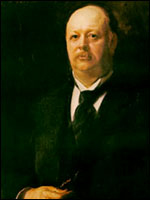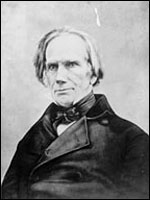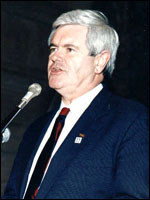
Sam Rayburn, the legendary Speaker of the House of Representatives whose nickname, “Mr. Sam,” easily merged with his identity as Mr. Speaker, once voiced his conception of the dignity of the office when a reporter asked him about his experiences serving “under” eight Presidents. “No,” Rayburn shot back, correcting the questioner, “I haven’t served under anybody, I have served with eight Presidents.”
The power and prestige of the speakership comes in large part from the manner in which the Speaker is chosen. Elected by the Members of the House, the Speaker is, in effect, the elect of the elect. Since the evolution of the two-party system, the Speaker most often has been the leader of the majority party in Congress. Although the powers of the office as the chief parliamentary officer in the House have changed over its 210-year history, the Speaker retains a great deal of influence over setting the tone and agenda for the body. Only fifty men have held the office. For most of its occupants the speakership has been the culmination of their political careers. The recent decision by Speaker Newt Gingrich not to seek the speakership in the 106th Congress made headlines precisely because of the importance of the office.
Gingrich’s decision has few precedents. Of his forty-eight predecessors, most left office only when control of the House changed party hands. Five Speakers: Michael Crawford Kerr (D-IN, 1875-76), Henry T. Rainey (D-IL, 1933-34), Joseph W. Byrns (D-TN, 1935-36), William B. Bankhead (D-AL, 1936-40) and Sam Rayburn (D-TX, 1940-47, 1949-53, 1955-61), died in office. Only two, Henry Clay and James Wright, resigned the speakership.

Henry Clay, one of the giants of nineteenth-century American politics, resigned the speakership twice. Elected to the House in 1810, he was elected Speaker on November 4, 1811, his first day as a Member of the Twelfth Congress. An idealistic, ardent young nationalist from Kentucky, Clay shared the anti-British sentiments of other Western and Southern “War Hawks.” Under his leadership, the House pressured President Madison into declaring war in 1812. When Britain offered peace negotiations in 1814, Madison appointed Clay as one of the negotiators. Although Clay said that he would have preferred to remain Speaker, he resigned his office on January 19, 1814, in order to accept appointment to the treaty commission. The House passed a resolution of thanks for his service as Speaker by a vote of 149 to 9.
When Clay returned to the House for the first session of the Fifteenth Congress on December 1, 1817, he once again was elected Speaker. On October 28, 1820, just prior to the third session of the Sixteenth Congress, he resigned as Speaker. His motivation was simple; he needed to devote more time to his law practice. The Depression of 1819, his generosity to friends and relatives, and quite possibly his gambling debts, had left his finances in a shambles. Clay served out the remainder of the Sixteenth Congress, seeing to completion the Missouri Compromise that won him the nickname of the Great Compromiser.
Speaker James C. Wright (D-TX, 1987-89) announced his resignation on May 31, 1989, bringing to a close an Ethics Committee investigation into allegations that the Speaker had violated House rules. The charges brought by a young Republican Member, Newt Gingrich of Georgia, were all dismissed; but the committee did find “reason to believe” that Wright had improperly sold his book, Reflections of a Public Man, in bulk to organizations in lieu of speaking honoraria. In announcing his resignation, Wright appealed to his colleagues to put aside partisan rancor and personal vendettas.

Wright’s successor, Thomas Foley (D-WA, 1989-95), served until the Republicans won control of the House in 1995 and elected Newt Gingrich as Speaker. Gingrich’s selection marked a departure. Chosen more for his role as spokesman and architect of the Republican revolution that wrested control of the House from the Democrats for the first time in forty years, Gingrich owed his election more to his ideological leadership than to seniority or ability to craft a consensus among his colleagues.
Prior to Gingrich’s election, those chosen as Speaker in the twentieth century had served lengthy apprenticeships in the House working their way up the leadership ladder. The average length of prior service for the men chosen to the speakership since 1896 had been nearly twenty years. Rayburn was in his twenty-eighth year in Congress when he became Speaker; John McCormack was in his thirty-second year; Tip O’Neill in his twenty-fourth; Wright in his thirty-second and Foley in his twenty-fourth. Gingrich had only sixteen years of prior service and passed over many more experienced leaders. Moreover, Gingrich bypassed the normal order of succession from party whip to party leader to Speaker.
Gingrich’s successor, J. Dennis Hastert (R-IL) has only twelve years of service; and he likewise is a departure from the normal order of leadership succession, bypassing both Majority Leader Dick Armey (R-TX) and Majority Whip Tom DeLay (R-TX). It remains to be seen whether the speakerships of Gingrich and Hastert mark the beginning of a new trend in which election to the speakership is determined by qualities other than, or in addition to, length of service and leadership experience.
Speakers of the House of Representatives
Key: F = Federalist, R = Republican, D = Democrat, W = Whig, FS = Free Soil
- Frederick Muhlenberg (F-PA; 1789-91, 93-95)
- Jonathan Trumbull (F-CT; 1791-93)
- Jonathan Dayton (F-NJ; 1795-99)
- Theodore Sedgwick (F-MA; 1799-1801)
- Nathaniel Macon (R-NC; 1801-1807)
- Joseph B. Varnum (R-MA; 1807-11)
- Henry Clay (W-KY; 1811-14, 1815-20, 1823-25)
- Langdon Cheves (D-SC; 1814-1815)
- John W. Taylor (D-NY; 1820-21, 1825-27)
- Philip P. Barbour (D-VA; 1821-23)
- Andrew Stevenson (D-VA; 1827-34)
- John Bell (W-TN; 1834-35)
- James K. Polk (D-TN; 1835-39)
- Robert M. T. Hunter (W/D-VA; 1839-41)
- John White (W-KY; 1841-43)
- John W. Jones (D-VA; 1843-45)
- John W. Davis (D-IN; 1845-47)
- Robert C. Winthrop (W-MA; 1847-49)
- Howell Cobb (D-GA; 1849-51)
- Linn Boyd (D-KY; 1851-55)
- Nathaniel P. Banks (FS/R-MA; 1855-57)
- James L. Orr (D-SC; 1857-59)
- William Pennington (R-NJ; 1859-61)
- Galusha A. Grow (R-PA; 1861-63)
- Schuyler Colfax (R-IN; 1863-69)
- Theodore Pomeroy (R-NY, 1869)
- James G. Blaine (R-ME; 1869-75)
- Michael C. Kerr (D-IN; 1875-76)
- Samuel Randall (D-PA; 1876-81)
- J. Warren Keifer (R-OH; 1881-83)
- John G. Carlisle (D-KY; 1883-89)
- Thomas B. Reed (R-ME; 1889-91; 1895-99)
- Charles F. Crisp (D-GA; 1891-95)
- David B. Henderson (R-IA; 1899-1903)
- Joseph G. Cannon (R-IL; 1903-11)
- Champ Clark (D-MO; 1911-1919)
- Frederick H. Gillett (R-MA; 1919-25)
- Nicholas Longworth (R-OH; 1925-31)
- John Nance Garner (D-TX; 1931-33)
- Henry T. Rainey (D-IL; 1933-34)
- Joseph W. Byrns (D-TN; 1935-36)
- William B. Bankhead (D-AL; 1936-40)
- Sam Rayburn (D-TX; 1940-47, 1949-53, 1955-61)
- Joseph W. Martin (R-MA; 1947-49, 1953-55)
- John W. McCormack (D-MA; 1962-71)
- Carl Albert (D-OK; 1971-77)
- Thomas P. O’Neill (D-MA; 1977-87)
- James C. Wright (D-TX; 1987-89)
- Thomas Foley (D-WA; 1989-95)
- Newt Gingrich (R-GA; 1995-99)
- Dennis Hastert (R-IL; 1999-2007)
- Nancy Pelosi (D-CA; 2007-11)
- John Boehner (R-OH; 2011-15)
- Paul Ryan (R-WI; 2015-2019)
- Nancy Pelosi (D-CA; 2020 –)
Originally Published: 2003 (updated in 2020)




